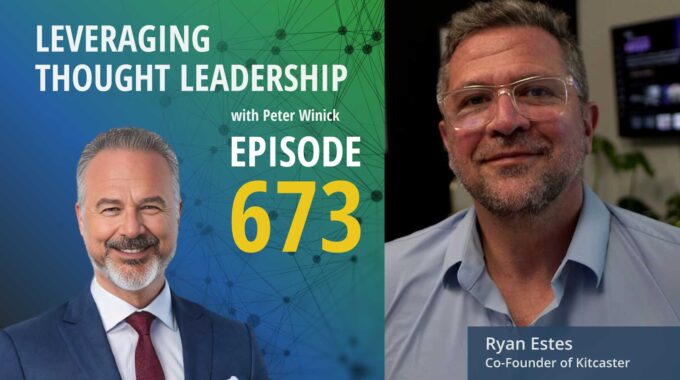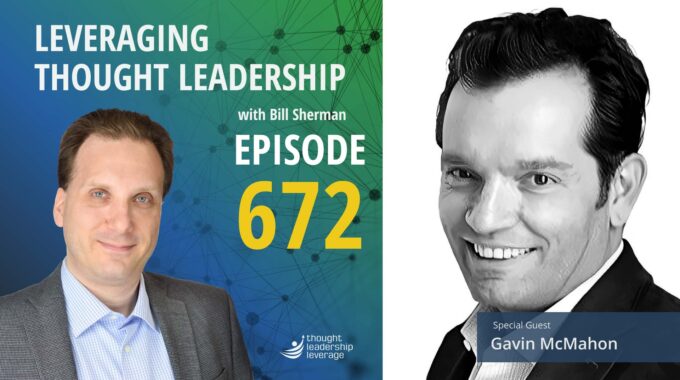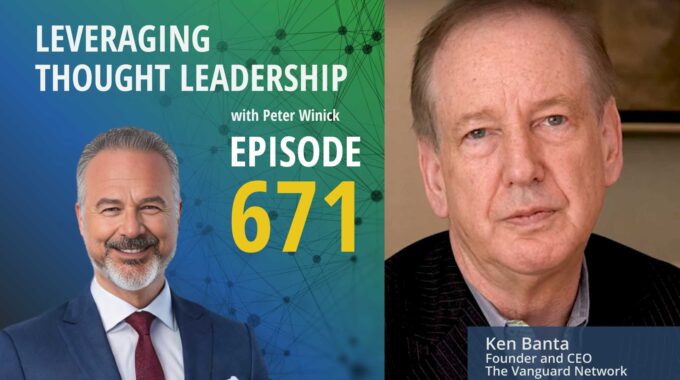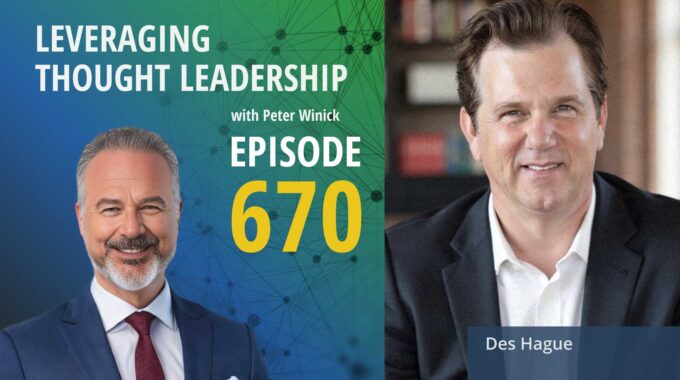Founder-led marketing, podcast strategy, and the art of authentic conversation What makes a podcast truly…
Leveraging Thought Leadership With Peter Winick – Episode 180 – Carolyn Monaco
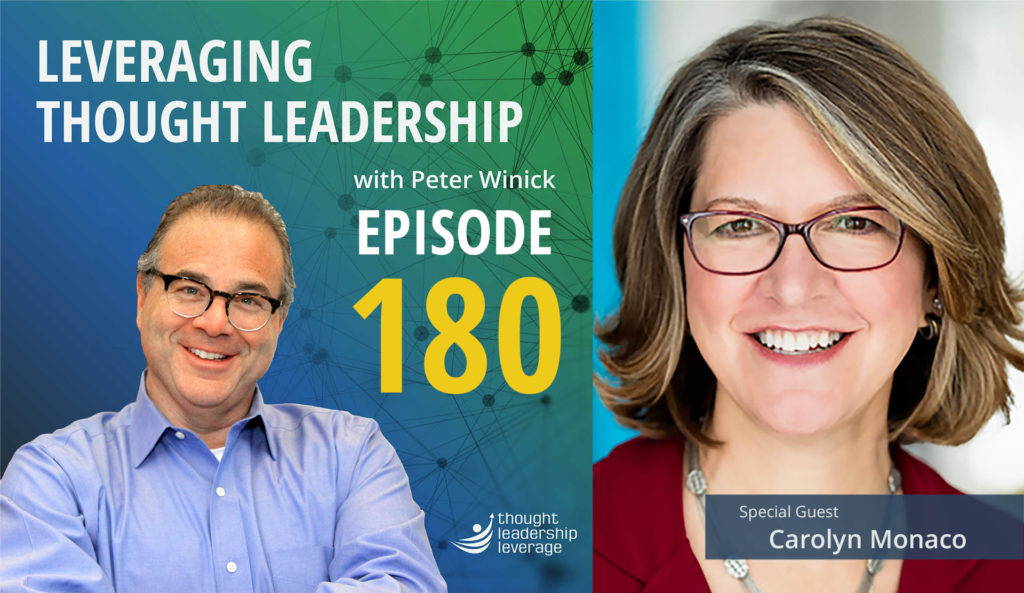
You might think once your book is written your job is done, but the fact is you are only halfway there. The other half is marketing the book, in an effective way, that will allow you to reach your audience and grow your business.
In this episode, our guest Carolyn Monaco is a publishing consultant with 25 years of experience in consumer marketing. She works with business leaders who are ready to reassess their brand, message, and platform. Before establishing Monaco Associates, she co-founded a media company for Tufts University and was Marketing Director for Harvard Business Review’s book imprint.
Carolyn debunks some common myths around publishing and helps budding authors understand what they can expect from traditional publishers. She reveals what you’ll need to successfully self-publish, and why you need to start beating the drum about your book months before it goes to market.
If you’re writing your first or fifth book, this episode is chalked full of great advice!
Writing a successful book can mean different things to different authors. Peter shares his insights into finding what success for your book might mean to you.
Transcript
Peter Winick And welcome, welcome, this is Peter Winick. I’m the founder and CEO of Thought Leadership Leverage, and you’re listening to the podcast, which is Leveraging Thought Leadership. Today, my guest is Carolyn Monaco. Carolyn works with business leaders who are ready to reassess their brand, messaging, and platform that often involves a pending book as well as a speaking career. Carolyn’s one of my, I wanna say, here is one of the people I admire very much in this space. She was at Harvard Business Publishing for a long time. where she was launching fifty to sixty books annually including books by John Carter, Gary Hamill, Marshall Goldsmith prior to that she was at the Atlantic she’s done some stuff at fast company and she’s currently working with a limited number of clients at a time now in a more intimate way so welcome aboard thanks for joining us.
Carolyn Monaco Oh, thank you, Peter, as you are a hero of mine as well. We have a great time working with our clients, don’t we?
Peter Winick Yeah, we do. So I just want to dive in because there’s so much that you and I can talk about in terms of the changes that you’ve seen in publishing. So let’s start on the publishing side. One of the things that I find, I don’t know if I’d say frustrating, but disappointing is all too often clients are coming to me and they have huge misconceptions around what a publisher does, what the relationship with the publisher is. roles and responsibilities, et cetera. And I think it’s just, it’s all been turned on its head the last 10 years. Give us a sense of what you see in the work that you do with clients. And again, you were on the publishing side and now you’re on the other side of the house. Just what that world looks like to you.
Carolyn Monaco Oh, what a great topic. Okay, here’s the lay of the land. For the last, I don’t know, 15 years, plus or minus the same number of business books has been published into that market space, which is about 6,000 a year, right? Say 500 a month on average, although it does happen in clumps, as you know. Those are books ranging from flip this house to a really wonky. difficult to ingest economics books say and everything in between and it’s the in between where I spend a lot of time and what’s changed in those dozen years is publishers have reduced their services right they’ve become much more clear on the fact that they are in the business of making money yeah and that’s had so many unintended side effects some of the publishers now are very overt in saying Author X, how are you going to sell your book with us? Others aren’t so clear about it. But in either case, the burden is now on the author to sell their book, right? And yet, authors come into this process thinking, whew, I’ve finally written my very best book. I can hand it off to the publishers.
Peter Winick Right, my job is done, not just, it’s not that it’s just beginning with a new job that they didn’t know they signed up for.
Carolyn Monaco Oh gosh, is that ever true? And then I come into the picture saying, no, no, come on, I can help you. The publishers aren’t well suited anymore to promote your book. But by partnering with them, you get tremendous capability.
Peter Winick So let’s take this back to really, really early in the process. So one of the things that I’ve observed is during the phase where someone’s pitching their book either directly or through an agent or whatever to a big publisher, and we can talk about a little bit later using self-publishing versus a traditional, the percentage of the decision that the publisher is making today, my opinion could be wrong, is more or at least equal to maybe more on what they believe that authors’ propensity to sell books are, and they’re looking at things like their followership, their LinkedIn profiles, their Twitter profiles. Would you agree with that? Because it used to be that they’re primarily looking for great content, and they would take on the marketing hat.
Carolyn Monaco Right, right. 150% agreement.
Peter Winick So if that’s the case, if I’m thinking I might want to write a book in five years, three years, two years, whatever, the onus is on me to build that platform and followership before I start having conversations.
Carolyn Monaco Absolutely. And that’s why strategy is so important. You know, some authors have that business to business opportunity. Other authors are more consumer based. So building the platform usually follows one or the other of those paths, right? But either way, it all should roll up way upstream, like you’re asking about. in the book proposal process. I am always a fan of saying that the book proposal is the most important marketing artifact of the entire process, right? Because that’s where you lay out the business case for the book. That’s where the authors say, okay, here’s my great idea. I’m gonna talk about it in a well-researched, revolutionary, accessible way. And here’s how I’m going to go out and sell it, right. And that’s. here’s how I’m going to go out and sell it plan. It’s so critical because when the acquisitions editor decides to pick up that book and propose it to his or her colleagues at the, say, weekly meeting at the big publishers, the salesperson at the table has to give it a thumbs up. If the sales person says, I just don’t see how we’re going to make any money off of this Fuck! then you know you’re really in trouble. So what I like to say is writing a book gets you half the way. The other half is marketing the book effectively.
Peter Winick In that marketing phase, and I think this is where the system is broken, quite frankly, it’s about lack of alignment. A publisher, their job’s really simple. They have to sell books. If they don’t sell books, they don’ keep the lights on. All of their energy, all of their focus, all their resources ultimately has to be around creating the greatest product they could, they can, to sell the book. The author, on the other hand, the book’s important to them, but probably lowercase I, meaning their income for the next five years isn’t based on whether that book sells 2000 copies or 8,000 copies. There are exceptions to that, but they have other things going on in their world, whether it’s their job, whether they’re speakers, whether it’s all this other stuff. And the book is just one piece. And I think that inherent lack of alignment is really where all that tension comes from.
Carolyn Monaco You are so correct. I couldn’t have said it better. It’s really all about getting and keeping your book as an author embedded in your business, not just for the first month, but for the first year and having a publishing strategy that looks beyond that one book.
Peter Winick Well, that timing that you mentioned, I want to touch on that because I think that’s key. The publishing universe looks at a book as a seasonal item. That was a spring release, a fall release, blah, blah. And then, you know, 90, 120 days into it, they reevaluate and realize or come to some decisions around, are we going to continue to invest in this or are we on to the next thing? For an author, the amount of energy and time and effort that you’ve put in the We need to look at that as an asset that you’re basically amortizing over a whatever, five year period, seven year period whatever, and if you don’t get all the energy that you were hoping for the first 90 days, that’s fine. You know, a good book, getting it into the hands of the right person has just as much impact now as it would in six months. And I think that’s another stress point.
Carolyn Monaco Absolutely. So the interesting thing is, as an author, you’re almost better off leveraging your book six months before the book comes out, before the books actually exist because that buzz around the book really, really excites event planners, for example, who take a long time to book you and then bring you in, right? And by that time, your book has been out for six months.
Peter Winick So Carolyn, what you’re saying is that as opposed to thinking about my book in terms of it will be released on October 1st, I’ve got all sorts of plans and activities, October, November, December. You’re suggesting to tease it out into the marketplace starting six months prior to the release, so tell me a little bit more about that.
Carolyn Monaco Absolutely. You hit the nail on the head. Here’s why. When it comes to leveraging thought leadership, it can start six, even 12 months before if you’re doing quite a bit of speaking, where you’re starting a quiet drumbeat about the book, right? And the drumbeat gets louder and louder and louder until the book’s release, where there’s suddenly an explosion of sound, right? Where the PR hits and the social hits, and the social influencers hit, and this peaking accelerates. All of that happens at once, but that takes a great deal of planning, right? It takes embedding the book in your business in a way that is highly tactical.
Peter Winick Interesting.
If you’re enjoying this episode of Leveraging Thought Leadership, please make sure to subscribe. If you’d like to help spread the word about our podcast, please leave us a review and share it with your friends. We’re available on Apple Podcast and on all major listening apps, as well as at thoughtleadershipleverage.com/podcast.
So I want to pivot for a moment to another topic that I spend a lot of time and energy talking to clients about, which is the realities and misperceptions of self-publishing versus traditional publishing. Let me just sort of disclaimer that. So traditional publishing, you know, typically big New York publishing houses. That’s one path. Self-publishing, to me, isn’t really just one size fits all anymore. There’s several different models under the self-publishing. Some of them are around the business model, some of them will print anything, some of the are somewhere in between in terms of their editorial influence. Give me a sense of your take on how people should go about making that decision and what are the things they should be thinking about when choosing which path to take for them.
Carolyn Monaco Oh, great question. So let’s step back for a minute from the book, right? From a book and think about business goals, right, because my work is all about using the book to accelerate the progress and the success of the business. So it all starts with this very honest, confidential conversation about who do you wanna be in three years as a product, as an author, right. Four years, five years. How does that affect your firm, your speaking revenues, your lead channel, all of that? And then we talk about the book really as a brochure for all of them, right? And so in that process, do you need to partner with a New York based publisher who has broad reach, who gives you some brand equity in their imprint, who, and this is critically important, gives you huge muscle for distribution. You can have the greatest product in the world, but if you have no distribution, who cares? Right. On the other hand, at the other end of the continuum for self-publishing, if you come to the table with a really good book idea that’s well researched, that’s accessible, that’s applicable to a broad piece of the market, and you’ve got your tribe organized, whether it’s your B2B tribe or your B2C tribe, go ahead and self-publish, because speed to market is something you can take out of the equation in that case, right?
Peter Winick Right. So here’s some of the myths, myths and air quotes that I hear. Oh, but if I self publish that, you know, that means that I was rejected by all the new houses and it’s a vanity press. You know, there’s cache that comes with being with a wily or random house. There’s they’ll do so much for me. The publishers sort of, you Know, bust those apart.
Carolyn Monaco Yeah, so first of all, publishers are constrained to do a whole lot in terms of promoting your book, right? They might give you some PR, they might give some examples and strategies that you can apply to promote your book to your network, but they’re going to count on you to do all the work, right. So It’s certainly a myth that publishers will quote, do a lot for me in my book, right? Close quote. It just doesn’t always happen that way. I’ve, you and I both spoken to authors who say, you know, I’m not even sure my editor ended up reading my manuscript. It just felt so distant to me, you know? And so there’s this alienation that creeps into the relationship, right. However. If it’s a good book and the timing is right, then that publisher is going to push it out through these really powerful distribution channels and that will really help. Another myth that you just brought up was this idea that if I self-publish, it’s because I was rejected. That’s no longer true. I look at the example of Charlene Lee, who’s been a guest on your podcast. I launched her first two books. one when she was at a firm forced to research with a co-author, the next when she was out on her own building her business, skipped to now her fifth book, she’s self-publishing, right? And in the middle of that, she worked with an online publisher who had an imprint, has an imprint, had some brand equity in that, but in a retained ownership of the IP, for example. So. Just to say all that another way, Charlene has run the gamut. She started traditional Harvard Business School publishing.
Peter Winick Which is about as traditional as it gets, in terms of…
Carolyn Monaco Absolutely, with a huge brand and huge reach, right? But now she’s self-publishing and she’s literally tried everything in between. Her experiences have changed, she’s become more of a master author and her goals and access to the market have changed. So it’s good to reassess all that along the way.
Peter Winick Yeah. So I want to touch on two other points there is speed and control. Yeah. So you don’t have control of those things when you go with a big publisher. It’s typically at least an 18 month process. And for some impatient entrepreneurial executive type authors, when they’re ready, they’re ready. So you can clearly do something quicker if you do it in a non-traditional route and then the control, you know, of what you’re saying and how you’re saying it, let alone the. craziness that goes on with covers and such. That’s my first thought. Second piece is I think people never sort of have this discussion enough around, wait a minute, what’s the business model here? So I have seen some really awful traditional publishing contracts lately where not only is it your basic royalty and not much of an advance and all that sort of stuff, but they’re forcing the authors to guarantee to buy X number of units at wholesale. And you do the math on that and say, holy cow, the author just took all of the financial risk. They just ran the first print run. So there’s no, it’s no longer the publishers taking the risk. You have to scratch your head and go, wait a minute, if you’re putting all this energy in, why do you want to do it to make a dollar a book when you might want to make, you know, $15 a book? So I think I’d like you to comment on that because it’s not the only reason, but it is another series of things I think people need to think through. Like, wait, what’s the math here? What’s the business model?
Carolyn Monaco Yes. Boy, are you right to point that out. So the business model matters to some authors more than it does to other authors. Speed to market matters when you’re an entrepreneur and you’ve already had a practice career of breaking the rules, right? And so you come to this whole thing thinking how are the publishers making any money? Why would I ever want to go with the publisher? I can do a better job than the publisher can. That may or may not be true. You know, you still need a plan, right?
Peter Winick Yeah, yeah.
Carolyn Monaco but these entrepreneurs rightly want to take a good 18 months out of that process because they’ve got something big to say now and they’ve got a burning urgency to do it, right? Right. So why would you do that? Well, you might do it because in the arc of your trajectory, it matters to have a random house or penguin random house on your book r
Peter Winick from a brand or a cafe perspective, right?
Carolyn Monaco Yeah, or even Harvard Business Reviews in print because it opens up doors within that company that you otherwise wouldn’t get. So yeah, you can make more money as a self-publisher. That is truly clear. But only if you have enough muscle in your own distribution channels, in your tribe, in your influencer network to push that book out in ways that matter. Otherwise, more and more you are facing what’s called a buyback, right? The publisher says, okay, here’s a small advance, right? Because we want you out there to have skin in the game. And we want to buy 6,000 copies, 8,000 copies, 12,000 in the first year. And here are the terms for that buy. The publisher is really covering their risks. to say, look, worst case scenario, you’re going to break even on us because you’re buying the books, author, and you’ve now got skin in the game. Go take care of this.
Peter Winick And that’s, that’s an easier deal for them to sell internally. Like, Hey, I was on the fence with this author, but we have no risk, right? If they’re trying to sell that up the food chain, uh, it’s, it it’s a no risk proposition to them. Their worst case scenario is still okay.
Carolyn Monaco So how do they do that is the question, right? You can do it a whole bunch of different ways, depending on your longer-term business goals. You could do it by embedding the books in your speaking in the first year plus. You can it by pushing your books through your influencer list, your network, on your own dime, of course. But if there is a plan in place to really monetize those copies, it can really make some sense. I mean, you got to think of your book. that channel, with that strategy, of course, is kind of a $25 marketing brochure. And then you’ve got to look at the ROI accordingly. With PR, if your book is very kind of hooky and has some topical reach, and you have a very good media specialist on board, you can really hook the book to what’s happening now and get some help with that.
Peter Winick And that’s a whole other art slash science. So anyway, this has been fantastic. We’re right about at the time’s up mark here. So I just want to thank you, Carolyn, for sharing so much with us. It seems like we violently agreed on a lot. So it might have been more interesting if we disagreed. But you and I have a similar perspective and both been doing this for a long, long time from different vantage points. So I appreciate all that you shared. And I think anybody that is in the process, whether it’s your first book or your fifth book. Listen to this one and listen to it again, because there’s a lot to unpack in here. So thanks so much for sharing with us today. Appreciate it.
Carolyn Monaco I look forward to another conversation. We should be more combative next time, for sure. Thank you, Peter.
Peter Winick To learn more about thought leadership leverage, please visit our website at thoughtleadershipleverage.com. To reach me directly, feel free to email me at peter at thoughtleadershipleverage.com. And please subscribe to Leveraging Thought Leadership on iTunes or your favorite podcast app to get your weekly episode automatically.


